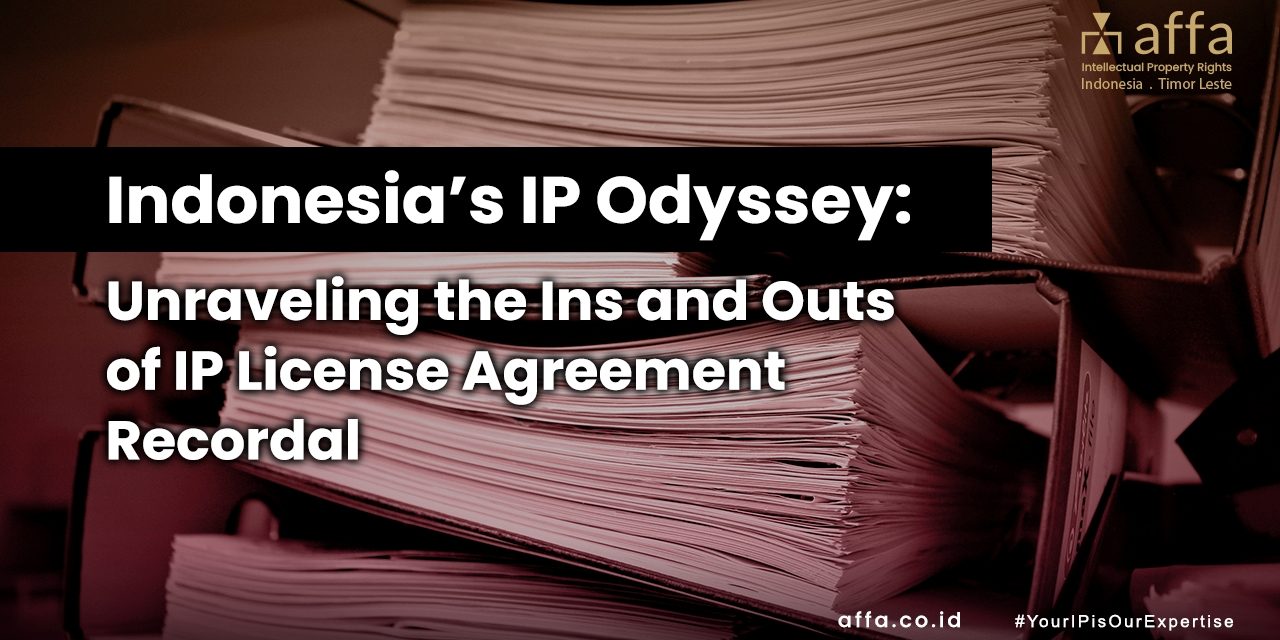In Indonesia, it is a legal obligation to record all intellectual property (IP) license agreements under laws relating to trademarks, patents, designs, and copyrights to ensure they are legally enforceable and binding to all relevant third parties. By law, any IP license agreements that are not recorded will not have any legal effect against all relevant third parties. Nevertheless, the agreements will still only be binding between the contracting parties. In recent times, there have been increasing demands by IP owners to record IP license agreements, because such recorded license agreements are often requested by SNI (the Indonesian National Standardisation Body) and BPOM (Indonesian Food and Drugs Administration) to issue certain yet separate licenses.
The Directorate General of Intellectual Property (DGIP) under the Ministry of Law and Human Rights (MOLHR) is in charge of receiving the recordal applications for the license agreements. The DGIP is empowered by Government Regulation No. 36 Year 2018 on the Recordation of Intellectual Property License Agreement (Government Regulation No. 36/2018) to carry on this function. While the practice of recording IP licensing agreements has actually been done for many years before the enactment of Government Regulation No. 36/2018, we noted that the DGIP only started issuing the notifications of the recordal of license agreements after 2018 for the recordals that were filed many years before that. Until then, many who had recorded them simply held on to the “recordal filing receipts” as an evidence of recordal.
In general, Government Regulation 36/2018 regulates various requirements and procedures for recording intellectual property license agreements and specifies the following matters:
- License agreements
- Recordation procedures
- Recordation excerpts
- Changes and revocations
As a general rule of thumb, the IP holder (“Licensor”) is authorized to grant a license to another party (“Licensee”) who wishes to use the Licensor’s exclusive rights. Such a license can only be granted based on an agreement made in writing in Indonesian – hence the agreements signed in English or other languages must be sworn translated into Bahasa Indonesia. In addition, the license agreement must stipulate the following points:
- Place & Date of the letter signing
- Details of the parties including the address
- Object of trademark license (trademark/patent/copyright/industrial design registration number)
- Terms of use (exclusive, non-exclusive, sub-licensable, or not)
- Duration of the agreement
- Territory
- For patents, the agreement shall stipulate the party tasked with the responsibility of paying the annuity.
However, be mindful that the term of the agreement shall not be longer than the protection period of the licensed IP. The license agreement must not entertain any stipulations that might inflict harm upon Indonesia’s economic vitality or the nation’s strategic interests. Moreover, it must not cultivate an environment for unjust business competition, nor should it stand in contradiction to the existing legislative framework in Indonesia. It is equally critical that such an agreement does not breach the bounds of religious adherence, ethical conduct, or public order.
Recordation Procedure
A submission of a Recordation Request must be formally made to the Minister written in the Indonesian language, accompanied by the following documents:
- A copy of the license agreement which has been notarized by a Notary Public in the relevant country where the parties reside;
- Official excerpts from the intellectual property certificate;
- A power of attorney letter (if applied for by proxy). It is noteworthy that the use of a proxy is mandatory if the Licensor and Licensee are foreigners or reside outside Indonesia;
- Copy of the identity card/passports of the signatories;
- Deed of Incorporation of the parties bound to the agreement; and
- Proof of payment of the official fees, which will be paid by the proxy.
According to Government Regulation No. 36/2018, the submitted request will be reviewed within five business days following the receipt of a fully completed application. The applicant will be informed if the application is incomplete, and they will be given a period of 30 business days from the date of notification to perfect it. However, thanks to DGIP’s innovation – POP Merek (POP Trademark), most of the IP license agreement recordal notifications are issued within a day.
Amendment and Revocation
A recorded IP license agreement can be amended and revoked. When it comes to amendments, they are limited to the name of the Licensor and/or Licensee or the subject of the license agreement, and other information (such as the address of the related parties, provisions related to the exclusivity of the license, and so forth).
A recorded IP license agreement can only be revoked under the following conditions:
- The agreement between the Licensor and the Licensee;
- The resolution of a court proceeding; or
- Additional elements, in accordance with Ministerial Regulation No. 8 of the year 2016 on the Procedure for Registering Conditions and Methods for the Application of Recording Intellectual Property Licensing Agreements.
Should you require further information and assistance regarding IP license agreement recordal in Indonesia, please contact us at [email protected]; [email protected]; or [email protected].








7 Comments